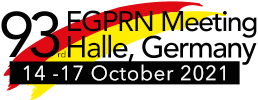Regional differences in the perception of COVID-19 pandemic management: A Germany-wide survey among general practitioners
Manuela Schmidt, Simon Kugai, Daniela Eggers, Katrin Balzer, Birgitta Weltermann
Keywords: general practice; pandemic management; regional
Background:
In Germany, different regional structures and processes, such as COVID practices, diagnostic centers, COVID taxis, and COVID home care teams, were developed to better serve the needs posed by the pandemic as well as to maintain regular patient care. International studies show that adaptable primary care is essential to meet pandemic demands and that implemented strategies in general practices have a high influence on local infection rates.
Research questions:
To identify regional differences in the experiences of general practitioners across Germany with existing and new health care structures and processes during the pandemic.
Method:
The web-based questionnaire addresses general practitioners’ experiences with regional pandemic management: newly implemented structures and processes for patient care and general interactions, cooperation with partners in the health care system, use of pandemic information, burden, capacity for pandemic decision-making, and lessons learned. The survey was distributed nationwide among German general practitioners. Standardized instruments such as the net promotor score were adapted to evaluate strategies of pandemic management, which were chosen based on clinical governance frameworks and the national pandemic plan. The study is funded by the German Federal Ministry for Research and Education.
Results:
A total of N=630 general practitioners participated in the survey, representing all German regions. Just over half (57.8%) of participants were male, with 18.8 (±9.6) years of professional experience. Practices differed regarding both number of employees (8.0, ±8.8) and number of patients per quarter (17.9% up to 1000, 31.6% 1001-1500, 18.4% 1500-2000 and 32.1% >=2001). Preliminary analyses show prominent regional differences regarding new structures/processes and their perception by GPs, e.g. COVID practices, test centers, COVID taxis. Detailed results will be available at the conference.
Conclusions:
The outcome of newly implemented structures and processes is influenced by the regional structure. The results will be used to support the revision of the German national pandemic plan.
Points for discussion:

